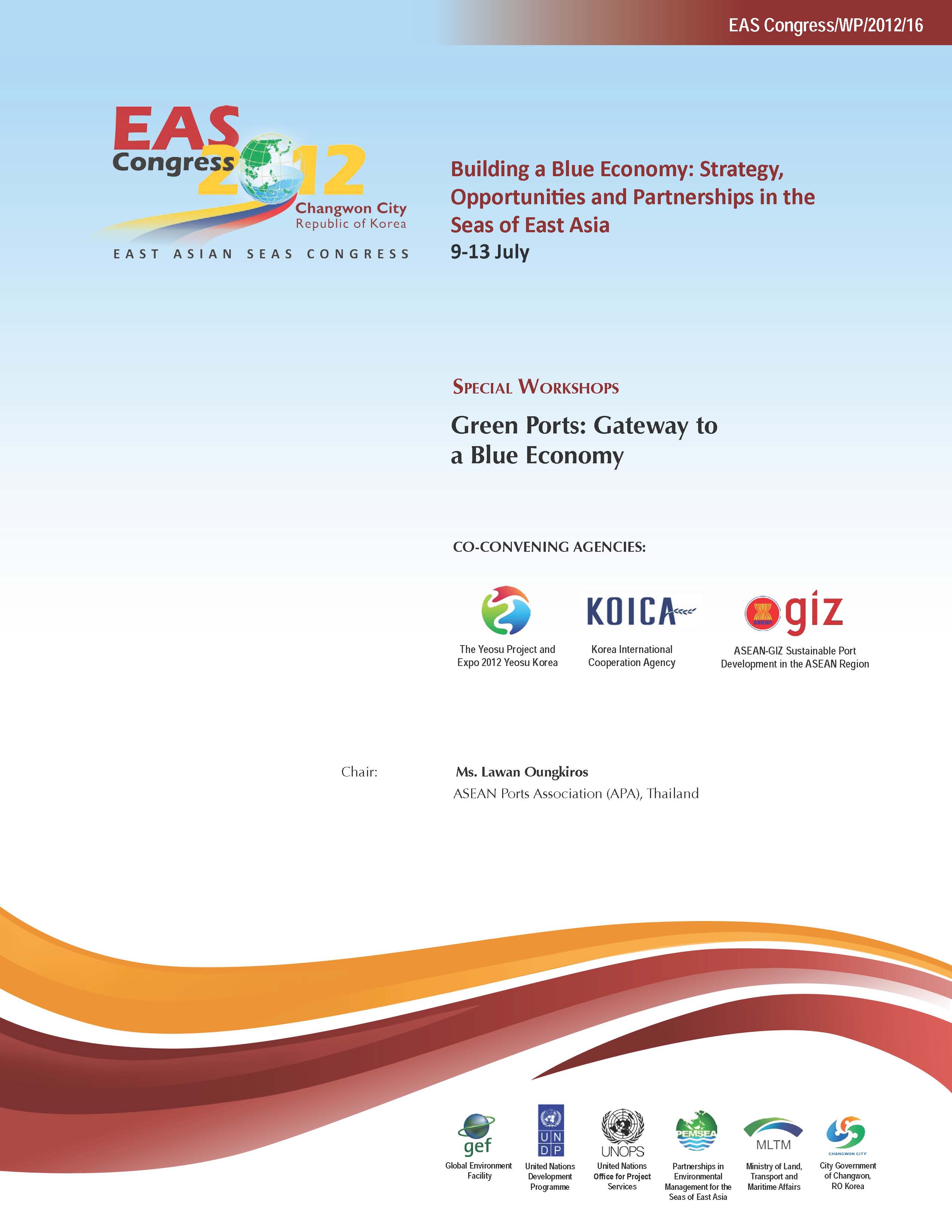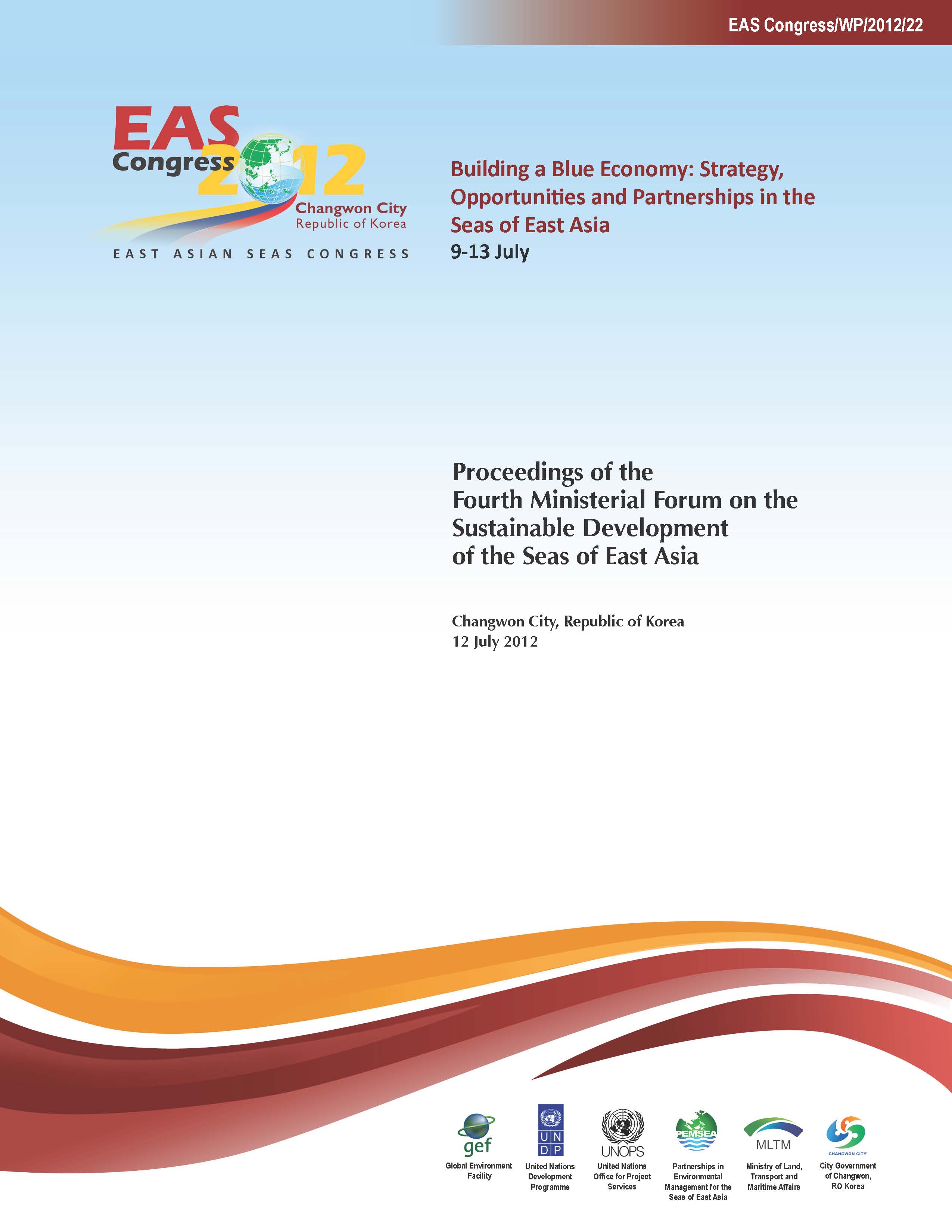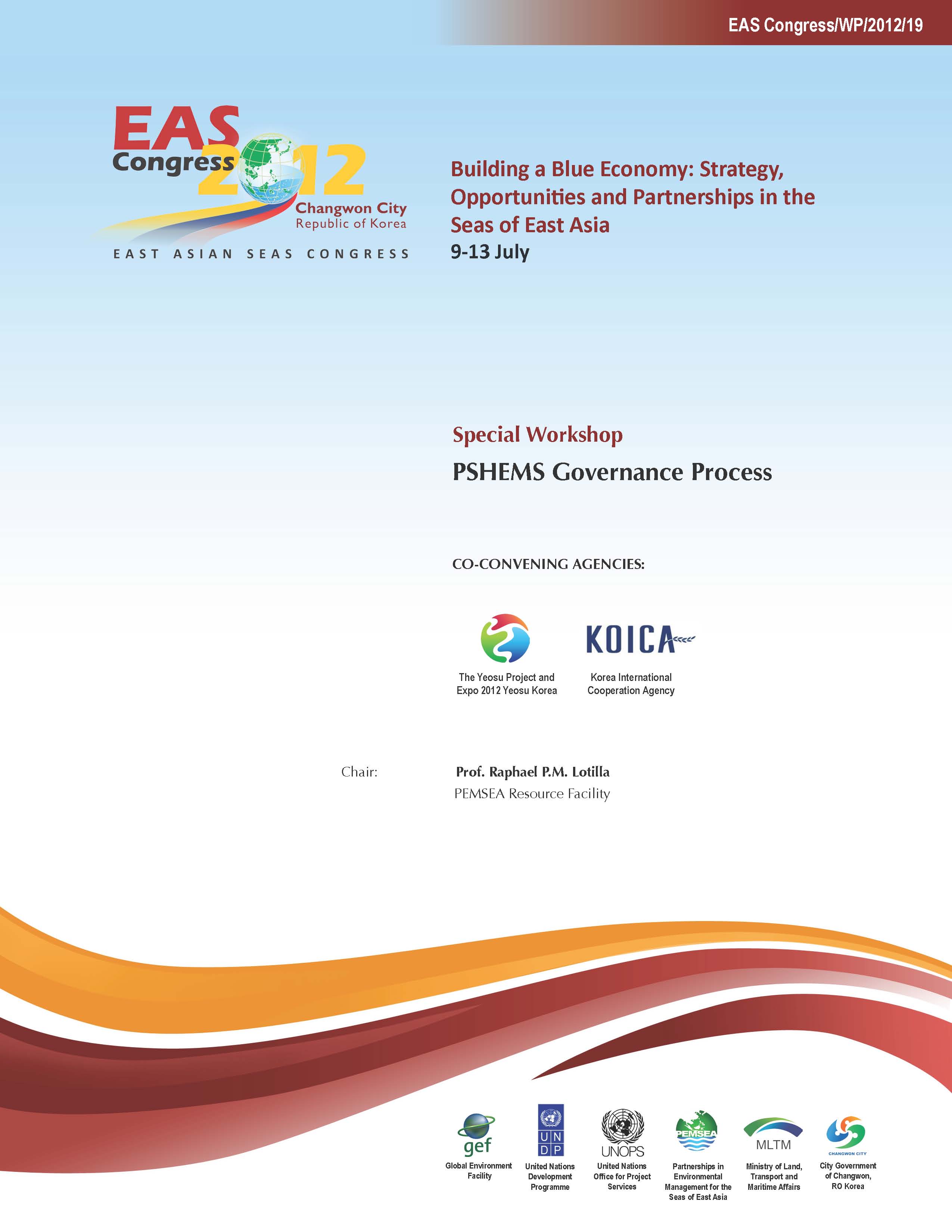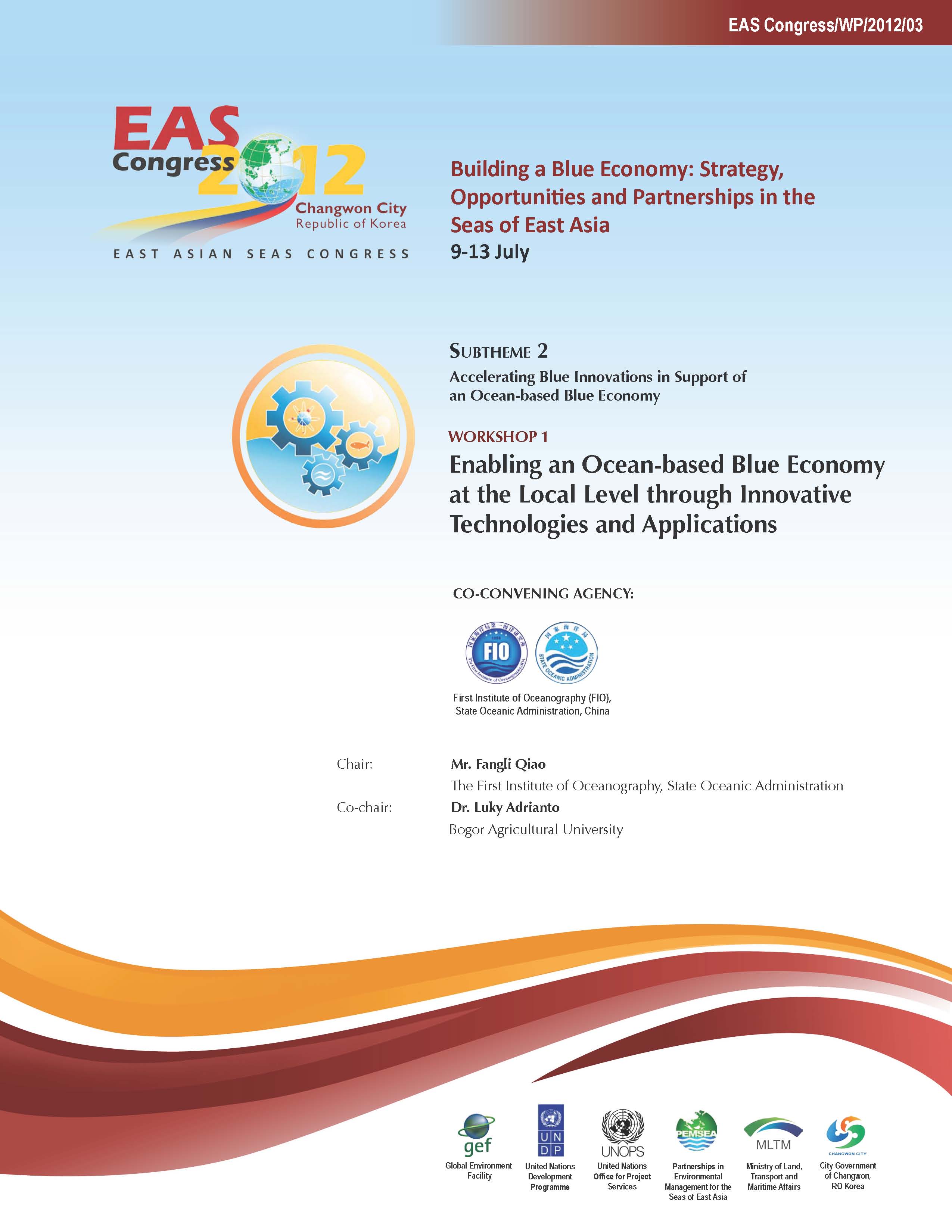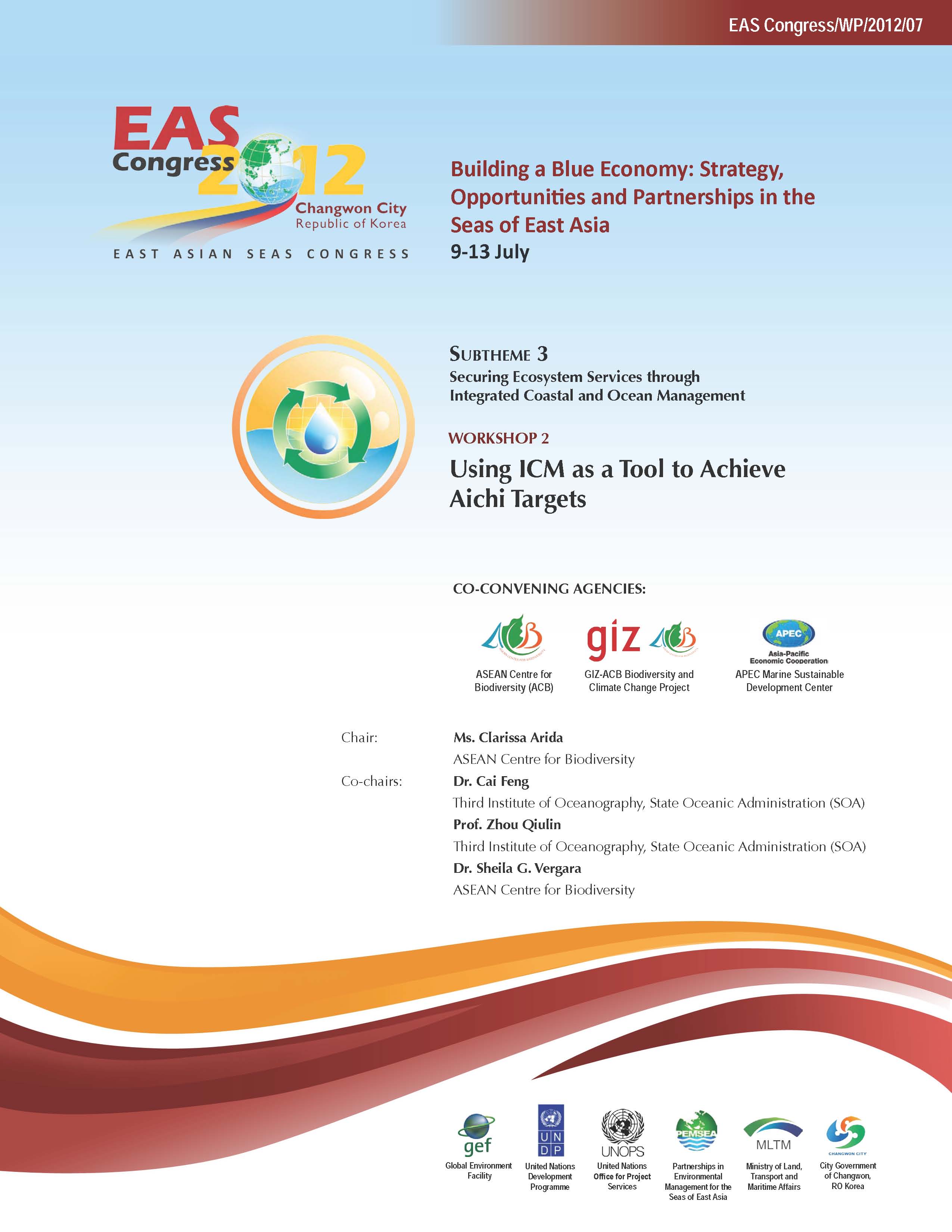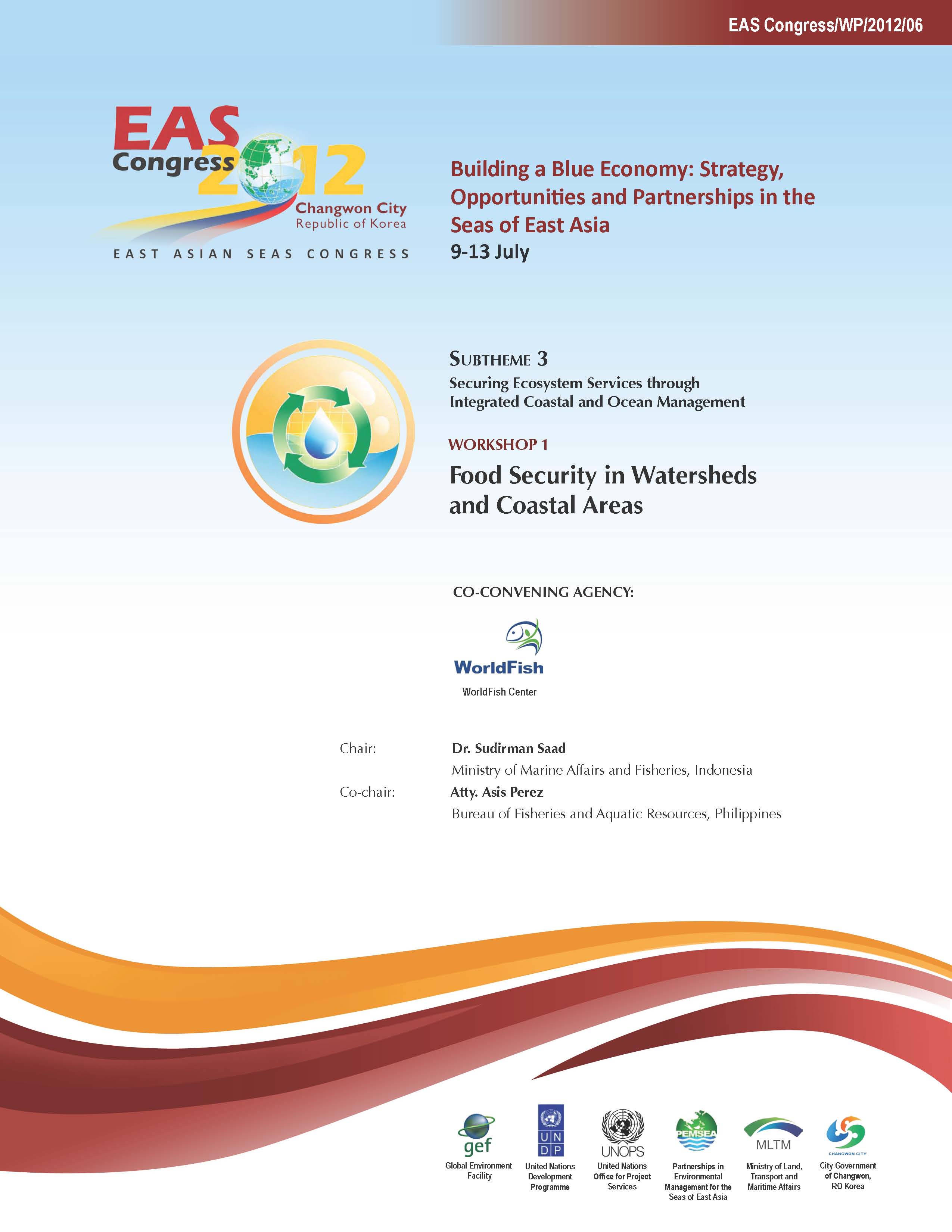
Breadcrumb
Proceedings of the Workshop on Safeguarding Ocean-based Blue Economy through Innovative Solutions to Climate Change and Disaster Risk Reduction
This publication summarizes the results of the workshop on Safeguarding Ocean-based Blue Economy through Innovative Solutions to Climate Change and Disaster Risk Reduction held during the East Asian Seas Congress 2012. The workshop explored sound methodologies and good practices in climate change vulnerability assessment as well as adaptation to climate change and disaster risk reduction, which are designed to enhance the resiliency of the coastal and ocean sector.
Proeceedings of the Speciel Workshop on Green Ports: Gateway to a Blue Economy
This publication summarizes the results of the workshop on Green Ports: Gateway to a Blue Economy held during the East Asian Seas Congress 2012. The workshop highlighted new initiatives by international and regional organizations, port authorities and port operators to implement safety, health and environmental programs/controls in the port to support the adoption of relevant convention, codes and standards for safety, health and environment. Current initiatives of the ports in the region, in particular, those that have developed and implemented Port, Safety, Health and Environmental Management System (PSHEMS), were likewise examined taking into consideration their overall role as gateways to a Blue Economy.
Proceedings of the Fourth Ministerial Forum on the Sustainable Development of the Seas of East Asia
This publication summarizes the results of the the Fourth Ministerial Forum on the Sustainable Development of the Seas of East Asia held during the East Asian Seas Congress 2012. The 4th Ministerial Forum on the Sustainable Development of the Seas of East Asia, the culminating event of the East Asian Seas (EAS) Congress 2012, in Changwon City, Republic of Korea, on the theme "Building a Blue Economy: Strategy, Opportunities and Partnerships in the Seas of East Asia," was held on 12 July 2012. Participating in the forum were 11 Ministers from the Seas of East Asia countries and observers from among the PEMSEA Non-Country Partners, together with PEMSEA's East Asian Seas Partnership Council Executive Committee, representatives from PEMSEA’s sponsoring agencies, the GEF, UNDP and the World Bank, and other observers from the local governments and the private sector.
Proceedings of the Workshop on The Future of the Maritime Transport in a Blue Economy
This publication summarizes the results of the workshop on the Future of the Maritime Transport in a Blue Economy held during the East Asian Seas Congress 2012. The various workshops highlighted and discussed the work of IMO and other international organizations, national and local government units and the private sector on their efforts in reducing the impacts of pollution caused by sea transportation and oil production including initiatives in enhancing capacities for oil spill preparedness and response at the regional, national and local level, specifically on the following: Global Regulatory Framework Toward Green Shipping IMO's Integrated Technical Cooperation Programme (ITCP) Ballast Water Control and Management Climate Change and Offshore Carbon Capture and Storage (CCS) Current Trends, Issues and Research and Development (R&D) Requirements in Oil Spill Response IMO-IPIECA Global Initiative (GI) in Southeast Asia Lessons Learned from Recent Oil Spill Incidents (Macondo Blowout and Hebei Spirit) Regional Arrangements on Oil Spill Preparedness and Response Developments in the Compensation Regime for Oil and Hazardous and Noxious Substances (HNS) Incidents Case Study on Oil Removal Operation from Sunken Kyungshin Building Capacities for Oil Spill Preparedness and Response at the Local Level HNS Preparedness and Response
Proceedings of the Special Workshop on the PSHEMS Governance Process
This publication summarizes the results of the Special Workshop on PSHEMS Governance Process held during the East Asian Seas Congress 2012. The workshop on PSHEMS Governance Process was convened to discuss the governance mechanism and processes for the operationalization of the Port Safety, Health and Environmental Management System (PSHEMS).
Proceedings of the Workshop on Enabling an Ocean-based Blue Economy at the Local Level through Innovative Technologies and Applications
This publication summarizes the results of the workshop on Enabling an Ocean-based Blue Economy at the Local Level through Innovative Technologies and Applications held during the East Asian Seas Congress 2012. The workshop was able to present examples of innovative technologies and approaches for maintaining and restoring ecosystem services and integration of the technologies into government programs through development plans and master plans. The discussions also highlighted the importance of using science in a meaningful way to guide local management decisions and actions for the protection of ecosystem services, developing the social capital, ensuring involvement of people, knowledge-sharing and learning from good practices as well as failures.
Proceedings of the Workshop on Using ICM as a Tool to Achieve Aichi Targets
This publication summarizes the results of the workshop on Using ICM as a Tool to Achieve Aichi Targets held during the East Asian Seas Congress 2012. The workshop explored good practices from country case studies on the use of marine protected areas (MPAs), integrated coastal management (ICM) and other approaches to address biodiversity loss, reduce pressures, improve the status and enhance benefits of coastal and marine biodiversity and ecosystem services to contribute to the achievement of the Aichi targets as embodied in the Strategic Plan for Biodiversity (2011–2020) of the Convention on Biological Diversity.
Proceedings of the Workshop on Our coasts and seas: The engine of the blue economy
This publication summarizes the results of the workshop on Our coasts and seas: The engine of the blue economy held during the East Asian Seas Congress 2012. The workshop under Subtheme 1, "Our coasts and seas: the engine of the blue economy," aimed to: Discuss national and local level initiatives in line with sustainable development principles. Examine the contribution of integrated coastal management (ICM) in the efforts to sustain the coasts and oceans of the region. Integrate the information to see how they contribute to the development of an ocean-based blue economy in the East Asian Seas region.
Proceedings of the Workshop on Food Security in Watersheds and Coastal Areas
This publication summarizes the results of the workshop on Food Security in Watersheds and Coastal Areas held during the East Asian Seas Congress 2012. With the WorldFish Center as the co-convenor, representatives from the national and local government agencies, nongovernmental organizations, private sector, civil society groups, research institutions and the academe from various countries participated in Workshop 1: Food Security in Watersheds and Coastal under Subtheme 3: Securing Ecosystem Services through Integrated Coastal and Ocean Management.

